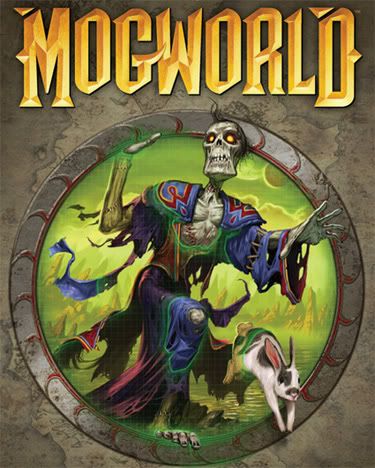One of the most wonderful and terrifying things about becoming a novelist is there’s no one “right way” to do it. It’s wonderful because it means anybody with writing talent (and some without) can do it, and it’s terrifying because it can be daunting to choose how to begin, where to go and what to do once you get there. Yahtzee Croshaw started out writing reviews of movies and games, short stories and freeware adventure games, and Mogworld is his first novel. After finishing it, I found myself hoping that it won’t be his last. With Sir Terry Pratchett ill and Douglas Adams dead for almost a decade, someone had to step up and fill the shoes of the sarcastic British genre novelist.

Jim is an apprentice wizard, studying arcane magic and thankful to be away from his fathers’ disgusting farm when his school is attacked by the neighboring war college. He’s killed, only to wake up sixty years later as a zombie under the command of a necromancer. It’s soon apparent that his world has become afflicted by some odd global condition that makes death a temporary inconvenience, but while some people wake up in a nearby church swathed in white robes when killed, Jim remains zombified. The prevailing sentiment among those still capable of coherent thought is that this condition needs to be fixed. Jim, however, could care less. Jim just wants to die permanently. Unfortunately, being an NPC in Mogworld, a massively multiplayer online game boasting revolutionary AI, this is easier said than done.
Yahtzee’s writing shows evidence of subscription to two of the biggest rules for good writing: “show don’t tell” and “less is more.” Tackling the first, Yahtzee is careful to never just have his characters spout their feelings verbatim. They are shown through the timbre of the conversation, their expressions and actions, the decisions they make and so on. Likewise, Yahtzee avoids the tendency of many, many modern comics with his “less is more” mentality, using running gags sparingly and instead using circumstance, intelligence and sarcasm to maintain a high level of humor throughout the book. And make no mistake, this book is very, very funny.
Of course, this is Yahtzee we’re talking about, so folks were probably expecting the humor. The existential angst, philosophical ramifications and metaphysical discussions, on the other hand, might catch some readers off-guard. The humor, in point of fact, begins to feel like something of a gateway drug. It’s the hook that pulls you into the story so Yahtzee can drive home what he’s really on about. The narrative goes some very dark places. It’s well done and presented in a very interesting way, so it wasn’t that jarring for me, but readers expecting the rapid-fire dirty jokes of Zero Punctuation may be filled with confusion.
If Mogworld has a flaw, it’s the decision Yahtzee made to write the novel in the first person. While it does draw in the reader and underscores the sort of immersion Yahtzee is always discussing in his reviews, there are a few moments where it feels less like Jim is his own character and more a mouthpiece for Yahtzee’s personal opinions and philosophies. Considering how much of Yahtzee’s voice and humor permeates the novel, Jim comes dangerously close to becoming an Author Avatar. Thankfully, as the novel goes on it feels more like Yahtzee is flirting with that distinction rather than being completely ignorant of it or knowingly crossing the line to speak to us directly about how silly or stupid we are to believe whatever we do that he does not. It’s gotta be hard to carry on a serious discussion on these subjects when your tongue is planted in your cheek, after all.
It’s really hard to hold a flaw this minor against the overall result when the humor is this funny, the characters this memorable and the jibes this cutting. For a novel, Mogworld is very good. As a first novel, it’s excellent, bordering on the fantastic. And for anybody out there struggling to put a novel together, it’s a challenge. Yahtzee got this written, edited and published while maintaining his web series and opening the Mana Bar. It puts the following question to other writers: “What’s your excuse?”

